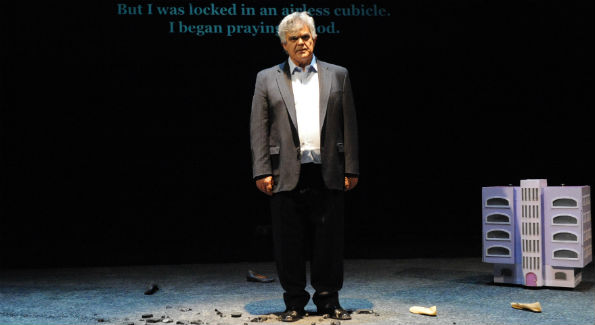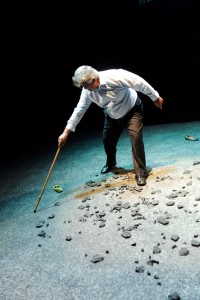A powerful one-man soliloquy at the Atlas Performing Arts Center takes on life in Gaza, the land of turmoil and grief.

Performer Gassan Abbas in I Shall Not Hate at Mosaic Theater Company (Photo by Stan Barouh)
There was a recent news story that three armed Palestinians killed a police officer in Jerusalem and were in turn killed by police. It is an all too familiar story of the ever roiling violent unrest in Israel. The Washington Post reported that since last Oct. 1, 27 Israelis and two foreign citizens were killed by Palestinians and 150 Palestinians were killed by Israelis.
Those aren’t necessarily the highest numbers of deaths both sides have suffered, but the continuing violence and the statistics of death and injuries have become so routine as to have a numbing sense of unreality. It is simply the way it is in a seemingly endless conflict that goes far beyond the numbers.
It is almost impossible to understand what it is like to live under that cloud of hatred and mistrust. The closest any of us can ever come to experiencing the terror and heartbreaking loss of loved ones to this violence can be glimpsed in “I Shall Not Hate,” a brilliant one-man soliloquy in Arabic and Hebrew in the Mosaic Theater in the Atlas Performing Arts Center. The sounds of the unfamiliar languages are effective for the story’s harsh reality: surtitle translations are projected onto the wall.

Performer Gassan Abbas in I Shall Not Hate at Mosaic Theater Company (Photo by Stan Barouh)
For 75 uninterrupted minutes, Israeli/Palestinian actor Gassan Abbas takes us through the horrifying experiences of Izzeldin Abuelaish’s memoirs adapted by Abuelaish and Shay Pitovsky, who also directed the production. Abuelaish is the tale of a young man who came out of a grim Gaza refugee camp, attended medical school in Cairo, and was the first Palestinian to serve a residence in an Israeli hospital.
By any measure, Abuelaish was a success. He escaped the rage and hopelessness of the camp, and even though he had influential friends among the Israelis, it always came down to the fact that he was a Palestinian from Gaza and faced the anger and mistrust of many Israelis. He is a respected gynecologist and as Abbas moves about the unadorned stage with only a suitcase, some debris and four pair of girls’ shoes, he relates for Abuelaish how many Israelis protested as he attempted to treat them or their wives, accusing him of having killed their children.
Abbas, a stocky man with white, bushy hair and a craggy, fiercely determined demeanor, is Abuelaish, a man unwilling to allow himself to be subsumed by hate, even though he has every right to rage at the injustices committed against him, his family and his people.
There are times when it is difficult hearing his story or looking at his face, but Abbas doesn’t allow you to avoid him. A masterful performer, he glares back at you in the intimate black-box space at the Atlas with the bleacher seating on three sides. He paces about at times, suffering in the restless cage of Gaza, while at other times almost dragging as he endures the frustrations and sorrows of his journey. There are brief moments of joy and love when he talks of his nine children, who he didn’t know as well as he should because of his long absences from home. One painful memory he cites is when he returned from an absence, his youngest son called him uncle.
Pitovsky’s direction is sensitive and confrontational. This is a brilliant example of theater that reaches its promise. There is no way to come away from “I Shall Not Hate” and be able to indifferently read the daily headlines. What Abuelaish accomplished in his memoir “I Shall Not Hate, a Doctor’s Journey on the Road to Peace and Human Dignity,” is to bring into sharp focus the tale of a boy from a refugee camp who, against all odds, became a respected physician, but all he accomplished could not protect him or his family from the turbulent realities of the
Middle East.
“I Shall Not Hate” is part of the Theater Voices from the Middle East Festival created by the Mosaic Founding Director Ari Roth who had a long run heading Theater J at the more conservative Jewish Community Center, where this production would not have staged.
There is a quote often attributed to Joseph Stalin that the death of one man is a tragedy, but a million deaths is a statistic. Abuelaish’s “I Shall Not Hate” is one man’s reality and the daily news bulletins of clashes over land, or the latest violent deaths, focus on the unarguable truth that all those deaths are much more that numbers.
“I Shall Not Hate” runs through Feb. 14, 2016. Tickets range from $20-$40 and can be purchased here.
